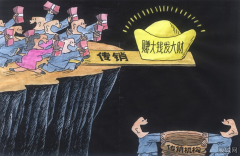2018-06-14 16:08
Impossibility: Grasping Historical Opportunities to Develop Digital Economy

[Direct Reporter, Beijing, 6 June] (People's Daily) Digital economy is a new economic form developed by human society. Today, it is increasingly becoming a new kinetic energy for global economic development and occupies an important position in the global economic development. Many countries and enterprises have actively developed the digital economy and fully seized new heights of economic growth. Different from the agricultural economy and industrial economy, land, labor, and capital are key production factors. The most distinctive feature of the digital economy is the use of data as a key production factor, and the effective use of network information technology as a core driver for improving total factor productivity and optimizing economic structure. force.
In recent years, China's digital economy has achieved rapid growth. According to statistics, in 2017, China’s digital economy reached 27.2 trillion yuan, accounting for 32.9% of GDP, and the digital economy has leapt to second place in the world. With the significant progress made in next-generation information technologies such as big data, cloud computing, and the Internet of Things, new artificial intelligence application scenarios are constantly being developed and discovered. The deep integration of the digital economy and traditional industries has become a strong driving force for China’s economic development.
Different from the Western developed countries, China's digital economy has its own characteristics, that is, China has ushered in informatization when it has not completed industrialization, urbanization, and agricultural modernization. "Sihua synchronization" has become the background of China's digital economy development. This not only poses great challenges to the development of China's digital economy, but also brings unprecedented opportunities. Informationization has made it possible for China to go through the course of industrialization, urbanization, and agricultural modernization that developed countries in the two or three hundred years have used in 20 to 30 years, and the digital economy has become a key driving force. Take the retail industry as an example. After a high degree of industrialization over the past century, the United States has produced an efficient modern retail industry represented by Wal-Mart. However, with the help of networked information technology, China has formed the world's largest e-commerce market in the past 10 years and has produced giant online retail companies such as Alibaba and Jingdong.
To drive information modernization and speed up the construction of digital China is an important measure to implement the strategic thinking of a strong nation of Jinping Comrades on the Internet. Grasping the opportunities for the development of the digital economy requires us to make full use of our unique data resources, give play to the role of data as a key production factor, and promote the continuous deepening of supply-side structural reforms. Different from the economies of scale at the production end of the agricultural economy and the industrial economy, the digital economy has a strong scale effect on the demand side. The more users, the larger and richer the amount of data produced and the higher the potential value of the data. At present, China's Internet penetration rate exceeds the global average, and it has the largest number of Internet users in the world, resulting in massive consumer and enterprise-end user data. China has become the world's largest Internet market and data resource country, which provides convenience for China's digital economy to continue its in-depth development. At present, it is necessary to speed up the promotion of digital industrialization, rely on the innovation of information technology, and constantly urge new modes of new industries and new modes of development to use new momentum to promote new development.
Today, China’s economy has shifted from a high-speed growth phase to a high-quality development phase. Data, a key production factor, can play a greater role. In the past, many industries, especially the manufacturing industry, were mainly production-oriented and focused on the process, scale, and efficiency of business production. Nowadays, we must make full use of data resources, play the role of data as a key production factor, gain insight into potential user needs from massive user data, and guide enterprises to change from production-oriented to market-oriented, and from business products to business users. This must promote the digitalization of the industry, make use of the new technologies and new applications of the Internet to transform the traditional industries from all angles, all angles, and entire chains, increase the total factor productivity, and release the amplification, superposition, and multiplication effects of the digital economy on economic development.
A key link in the development of the digital economy is to vigorously cultivate digital talents and strengthen the human resources foundation of an innovative country. Now, Internet companies such as Tencent, Alibaba, Baidu, and Jingdong have accumulated massive user data from multiple dimensions of consumption, social networking, travel, communications, and payment, and have developed various core products to promote the Internet, big data, and artificial intelligence. Applications in daily consumption, life services, etc. The digital transformation of the demand side already has a good foundation in the industry, and is gradually achieving cross-industry and cross-regional development and integration. However, the digital transformation of the supply side is still in its infancy. In particular, the digital transformation of traditional industries such as manufacturing and healthcare still has a lot of room for development. If the demand-side digital transformation mainly relies on the data dividends brought by massive users, then the supply-side digital transformation is more dependent on talent-driven. Cultivating digital talents with digital literacy is the strategic basis for promoting China's economic digital transformation and building an innovative country.
Digital talents not only include information technology professional and technical talents in the traditional sense, but also cover cross-border talents who can complement and collaborate with information technology expertise and have digital literacy. At present, most of the digital talents are distributed in the traditional product R&D and operation fields. The total number of digital talents in digital strategic management, in-depth analysis, advanced manufacturing, and digital marketing is relatively small. To cultivate digital talents vigorously, innovative talent training models are needed, and in-depth cross-border cooperation between industries, universities, and research institutes is promoted, and a technological innovation system that integrates enterprises as the main body, market-oriented, and production, education, and research is deeply integrated. We will improve the institutional mechanisms for technological innovation, achievement transformation, and talent development to create a good atmosphere for the cultivation and development of innovative talents, and allow all types of innovation bodies to send out strong vitality.
|

